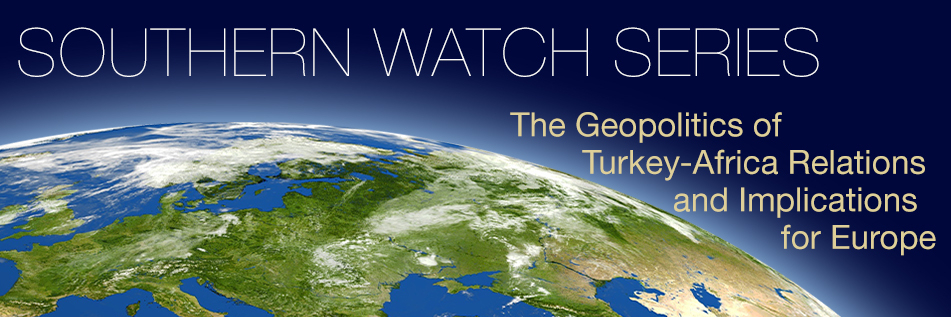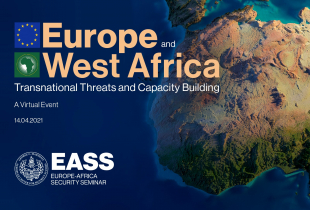
The Geopolitics of Türkiye–Africa Relations
Introduction
Participants from Europe, Africa, the Middle East, and the United States gathered online to discuss Türkiye and Africa as part of the Southern Watch Series (SWS) in June 2022. The SWS is an ongoing series of virtual conversations surveying current and emerging security challenges in Africa and the Middle East, and their implications for Europe and the United States. It is an initiative of the Marshall Center’s European Security Seminar – South. The conversation featured remarks from Dr. Elem Eyrice Tepeciklioğlu of Yaşar University and Mr. Abdinor Dahir, a researcher and consultant for the government of Somalia. This article benefited from inputs from Dr. Cüneyt Gürer and notes taken by Ms. Solène Dislaire. These highlights reflect non-attribution takeaways that emerged from group discussion and do not represent the views or positions of any individual panelist or participant.
Türkiye presents itself to Africa in many guises.
Türkiye under the Justice and Development Party, or AK Party, of President Recep Tayyip Erdoğan aspires to greater prominence, and Africa has a place within Ankara’s grand strategy. Across the past decade or so, the regime has anchored Africa within its foreign policy agenda as an area of influence – a place outside its troubled relationship with Europe, where Türkiye can shape multilateral security matters. Türkiye plays different roles and shows different faces in Africa, cultivating at least four distinct profiles. First, Türkiye can present itself as a successful, developed, and ‘Westernized’ country – an early member of NATO and a candidate for membership in the European Union (EU). This profile resonates with Africans’ general belief that Türkiye has modern and robust public education and health care sectors. In this mode, Türkiye’s has been an important donor and benefactor for the Africa Union and G5 Sahel. Second, Türkiye can present itself as a Middle East powerhouse, a leader of integration within the MENA region. Here Türkiye celebrates the Ottoman legacy, including the historic connections to certain African lands. Third, Türkiye can present itself as a middling power on the world stage, distinct in its approach to Africa from both the global powers and from the former metropoles of African colonies (e.g., France, Portugal, Spain, and the United Kingdom). In this view, Türkiye has no colonial past of its own in Africa, and the country has no self-seeking agenda today. Rather, it desires ‘win-win’ partnerships, a narrative accepted by many Africans. Fourth, Türkiye can present itself as a fellow emerging nation in solidarity with Africa as part of the Global South. In this mode, Türkiye emphasizes the critiques it shares with Africans of current multilateral organizations like the International Monetary Fund, World Trade Organization, and the United Nations Security Council, all of which (so the argument goes) deny the Global South its rightful role in international decision-making. Türkiye expresses a desire to collaborate with Africans on climate change, and it shares positions with Africans on trade regulations and global governance. At the UN, for example, Türkiye has sponsored a resolution against recognition of Jerusalem as Israel’s capital, a position supported by most African delegations. Versatile in its self-presentation, Türkiye manages to be Western, Eastern, a middle power, and a peer in its relations with Africa.
Soft power influence is Türkiye’s strength in Africa.
In an about-face from the Republic of Türkiye’s founding secularism, the current regime embraces religion in the foreign policy arena, infusing religious references into its diplomatic engagements, for example. Ankara recognizes the power of religion in international affairs, and it deploys Islam to build bridges with Muslim-majority African countries. Türkiye’s public diplomacy tends to be more responsive and effective than that of other external actors. Ankara benefits from a strong media presence and shows commitment to overcoming the language barrier through outstanding translations into local languages. Türkiye under the AK Party would like to be seen as a benevolent humanitarian. It loosened restrictions on NGO funding and allows NGOs to operate in risky areas, raising their visibility and popularity. Türkiye would also like to be considered a reliable mediator of sub-Saharan conflicts. For example, Türkiye has tried to facilitate relations between Somalia and Somaliland, albeit without much success. Other African conflicts were evoked at the 2021 Türkiye-Africa Summit, the third such meeting since 2008. Türkiye’s current approach in the spheres of religion, public diplomacy, and humanitarian assistance is being institutionalized, meaning the highlighting of religion could persist even if a new administration reverts to secularism, for example. Türkiye’s soft power labors are building momentum and generating a positive image of Türkiye among Africans.
Türkiye’s economic and defense investments involve some reputational risk.
Türkiye has recently begun to invest in African economies and militaries. Africa, the region arguably benefiting least from globalization, seeks greater connectivity to world markets and increased access to foreign direct investment (FDI); it also hopes to benefit from competition among companies arriving on the continent. In economic terms, Türkiye has short-term interests in negotiating for a piece of Africa’s energy resources (e.g., in Somalia) and long-term interests in Africa’s growing population and markets. Ankara is building up trade relations and the market share of Turkish private firms. Turkish businesses, especially those in small cities, have joined civil society and government agencies in the push for an Africa focus in Turkish policy, and Ankara has eased entry for Turkish businesses into Africa, even if its official FDI numbers on the continent remain comparatively small. Turkish companies sometimes compete at a local level and secure contracts in Africa for infrastructure projects, like railroads. Türkiye has proven its readiness to do business, offer competitive prices, and diversify its trade relations. In political terms, Türkiye is a proponent of stability. It is open to supporting state-building projects, and Ankara is looking for a cost-effective model of military engagement in sub-Saharan Africa. It seeks a less expensive approach than its high-priced engagement with energy-rich Mediterranean countries like Syria and Libya. In Africa, Türkiye has expanded its military influence incrementally and within limits – progressing from bases to training facilities, for example, and concentrating on specific threats. With its own long experience with terrorism, Türkiye hopes to be seen as a credible counterterrorism partner and has focused its military training in Somalia on counterterrorism for more than a decade. The effectiveness and impact of Ankara’s new economic and military commitments remain to be seen, and they do incur risk. Türkiye may find, as other external powers have, that ‘respect for sovereignty’ and non-interference in any African internal politics can ultimately undermine their investments. Moreover, a hands-off, light-touch approach to security cooperation – one that foregoes conditionality but also restricts Türkiye’s role to training and advising, rather than joining in operations – could ultimately disappoint Africans looking for a partner ready to combat terrorists by fighting side by side. Above all, Türkiye’s intention to expand its weapons sales (in part to boost its domestic arms industry and thereby lessen its own dependence on foreign weapons suppliers) could create a backlash against Türkiye in Africa. Selling drones to Ethiopia, for example, can make Türkiye seem less like a humanitarian actor and more like a party to a conflict.
Türkiye–Africa relations exemplify the possibilities for newcomers in Africa.
Ankara is charting a unique course and fine-tuning its level of ambition in Africa. Türkiye is not quite a ‘rising’ power in Africa because it follows self-imposed limits: it has neither the capacity nor the desire to become a major player on the continent. Rather, Türkiye is a niche actor. It focuses on specific domains, where it has a comparative advantage over other external actors (e.g., religion); and on specific countries, where it can pursue strategic objectives bi-laterally (e.g., Senegal, Nigeria, and Somalia). Ankara has discovered ways to stand out and burnish its image in Africa. For example, Türkiye emphasizes that its businesses hire Africans as well as Türks and have all personnel live and work together while building roads and railroads, pointing out that European workers tend to live separately and the Chinese tend to import their own laborers. Ankara highlights how its military forces persist in training even as France and other European countries are withdrawing from Africa. And Türkiye contrasts its inherent respect for Africans with China, which may bring more FDI to the continent, but also brings ‘dumping scandals’ and culture clashes. African governments have proven amenable to Türkiye’s desire for a seat at the partnership table, because they generally prefer to balance relations among many separate partners and dislike on principle the notion of a single ‘donor bloc,’ which could hide a tacit agreement among those donors to keep Africans insecure or dependent on foreign aid. Despite Western hopes, then, Ankara may well decline collaboration with the EU in Africa, remaining inclined instead to continue to act in a parallel or complementary fashion for the sake of its own national interest. One great lesson of twenty-first-century Türkiye–Africa relations is that there is room for everyone to partner in Africa. The era of African countries being bound by colonial legacy or geographic proximity is over. For countries like Korea, Japan, and Malaysia, Türkiye exemplifies the possibility of forging brand-new partnerships with African nations, virtually from scratch. By picking its battles and narrowing its scope, Türkiye is writing a success story of its ‘just so’ positioning in Africa.
GCMC, Garmisch-Partenkirchen, June 15, 2022
About the Author
Dr. Benjamin P. Nickels is Professor of International Security Studies and Director of the European Security Seminar – South (ESS-S) at the George C. Marshall European Center for Security Studies. He leads the Marshall Center’s resident, outreach, virtual, and partnership programming on European and U.S. relations with North Africa, Sub-Saharan Africa, and the Middle East.
The George C. Marshall European Center for Security Studies
The George C. Marshall European Center for Security Studies in Garmisch-Partenkirchen, Germany is a German-American partnership and trusted global network promoting common values and advancing collaborative geostrategic solutions. The Marshall Center’s mission to educate, engage, and empower security partners to collectively affect regional, transnational, and global challenges is achieved through programs designed to promote peaceful, whole of government approaches to address today’s most pressing security challenges. Since its creation in 1993, the Marshall Center’s alumni network has grown to include over 16,000 professionals from 160 countries. More information on the Marshall Center can be found online at www.marshallcenter.org.
The Clock Tower Security Series provides short summaries of Seminar Series hosted by the George C. Marshall European Center for Security Studies. These summaries capture key analytical points from the events and serve as a useful tool for policy makers, practitioners, and academics.
The articles in the The Clock Tower Security Series reflect the views of the authors and are not necessarily the official policy of the United States, Germany, or any other governments.
